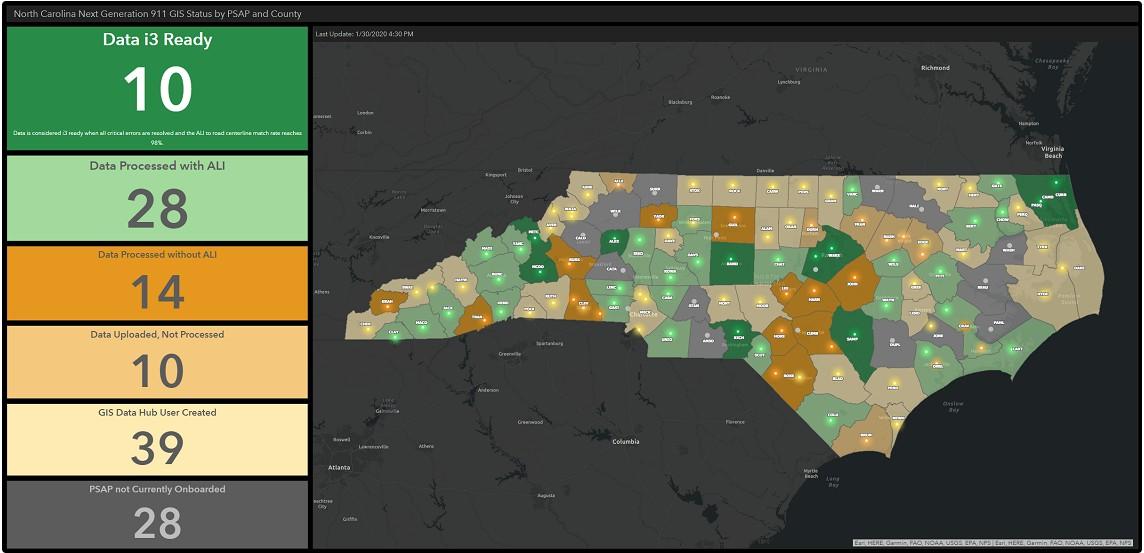

IT Governance Business Case Next Generation 911 Mandatory Compliance DECC 911
Background

The State of North Caroling is implementing Next Generation 911 (NG911) to ensure residents are able to access 911 services regardless of their location or the communication technology they use. This will vastly improve the efficiency and effectiveness of emergency response
As such, DECC 911 is required to fully implement this new technology no later than July 2021
Current State
• Currently in 911 systems, Geographic Information Systems (GIS) data are used for mapping a caller’s location and supporting dispatch functions
• 911 calls are mapped based on address range, street name and city information stored in the tabular Master Street Address Guide (MSAG)
• Durham's current 911 system operates effectively and efficiently as designed and maintained. Durham DECC 911 has no current pain points in regard to 911 dispatching
• The State of North Carolina is mandating the implementation of a new 911 state-wide dispatch system Emergencsy System Internet (ESINET) protocol

Current Pain Points
• Some counties' existing 911 systems rely on outdated analog systems to communicate
• Currently if one county’s 911 system has an outage, another neighboring county may not be able to pick up and answer calls for the lost system

• Current 911 calls are routed based on the closest cellular service which isn’t as accurate as the specific caller’s location
• Collaboration between responsive jurisdictions will need to be determined

Desired Business Value
City of Durham’s Strategic Plan Goal: Innovative & High Performing Organization
• To comply with the state’s mandate by transitioning to a fully functional NG911 eco-system compliant with the National Emergency Numbers Association (NENA) i3 Standards and Best Practices
• Increase accuracy, efficiency, and responsiveness of the 911 system for the residents and visitors of Durham County

Future State Benefits (NC Statewide)
• More sophisticated ability to route calls based on the caller’s geographic location (and not just the closest cell phone towers)
• Call centers will have the ability to manage and route advanced communications such as texts, instant messages, and VoIP services

• Deliver video-to-911
• Provide for 911 call load sharing among PSAPs (Public Safety Answering Point) during emergencies, so that when a storm overloads one PSAP, a neighboring PSAP can automatically receive overflow calls
• Provide accurate, reliable, and timely location information for 911 telecommunicators and field responders, especially for wireless and other nomadic 911 callers
Next Gen 911 IT Roadmap
• Implement the NG911 Network – Durham 911 was the first NG911 PSAP in the country to go into production with AT&T ESINet and Hosted Call Handling services
• Continue Develop a GIS Geospatial Service with GeoComm – The required GIS datasets have been validated by the GIS division. The GIS data will be used to enable the Emergency Call Routing Function (ECRF) to determine the 911 call center where a call should be routed, and the Location Validation Function (LVF) to identify the correct location of a civic address (house number and street name)

What is GeoComm’s role?

• GeoComm was selected by the North Carolina Board for Next Generation 911 project, aimed at preparing the state for a NG 911 system implementation
• As part of the project, GeoComm will complete a statewide GIS educational campaign aimed at helping the local agencies understand the goals of the statewide NG 911 project
• GeoComm will complete a GIS data assessment of each individual county’s GIS data to determine its readiness for a NG 911 System


Status for Durham County: -
Information
Current
Data processed without Automated Location
- Needs to be Data i3 Ready by July 2021 https://it.nc.gov/next-generation-911-gis-services
Recommended Solution and Analysis

NG 911 Compliance: Project Financial Estimate

COST ESTIMATES
FUNDING
*Total Project Funding Requested (External), includes External Year 1 Run Costs and Non-Labor
Description Year 1 Costs (Hours) Annual Run Costs (Hours)/ KTLO Departmental Funding Amount: $0 Labor $ (Hours) Internal TS: 205 hours 25 hours Funding Requested (Y/N): N Business Analysis 10 hours 0 hours TS Services (GIS Division) 125 hours 25 hours Project One Time Costs $0 TS PMO 70 hours 0 hours Project Run Cost (External) $0 Internal Department: DECC 911 50 hours 25 hours *Total Project Funding Requested for Year 1 $0 External: $0 $0 *Recurring Costs $0 Professional Services: $0 $0 $0 $0 Non-Labor $ Hardware: $0 $0 Software: $0 $0 Other: $0 $0
Risk Identification

Description of Risk Risk Impact Mitigated (Y/N) Contingency(Y/N) Poor execution Low No No Project team turnover High No No Vendor performance Low No No Cyber Security Low No No
Mitigation Risk (Costs)

• No Cost
Contingency Risk (Costs)
• No Cost
Our Ask
We are asking to approve the Next Generation 911 Platform Compliance Business Case in accordance with the North Carolina Statewide Mandate.







